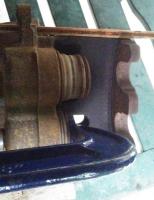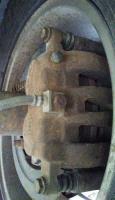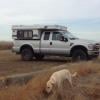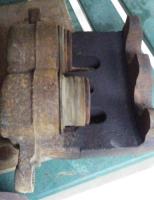I agree with not turning rotors, especially on a Tacoma where thinner rotors are vulnerable to warpage -don’t know about other trucks. If you replace the solid rotor with a slotted one and quality pads you will immediately see why I recommend that. The braking improves right away, not because of heat dissipation (that is done by the fins between rotor faces) but more because the slots clean water and dust and I regularly deal with one or the other. I have not experienced the rotor wearing more because of the slots but that is possible. My pads do tend to wear fairly fast because I buy ones that are a little softer but they also brake better and I am all about the best braking I can get taking the weight down those mountain passes and steep BLM roads here in the West. With all of the rain here, deep puddles and small stream crossings the slots also recover faster from getting wet. I would never use the drilled and slotted rotors for a number of reasons but the slotted ones make a lot of sense when you carry the weight of truck and camper.
Rotor and brakes question
#11

Posted 17 April 2018 - 05:24 PM
#12

Posted 17 April 2018 - 08:16 PM
^ Thanks, I do take it all under consideration.
I hear what you're saying tho I've been sticking with oem or Motorcraft's retail version for this vehicle. It has been working out ok for me and pricing from my dealer is decent (like Rockauto w/o the freight). Also truck is oddball (C&C, srw) so I'm sometimes a little wary about fitment...
Curious now about surface wear, will micro the old and new for giggles.
cheers,
#13

Posted 18 April 2018 - 12:03 PM
It Tacoma rotors are that thin, perhaps one has to expect to replace them at more frequent intervals than full size or HD trucks.
But, I've turned (resurfaced) solid rotors at every other pad installation on Ford Super Duties for over 40 years. While turning does remove material and ultimately reduce life span of the rotor, the enhanced braking quality of a turned rotor due to debris and warp removal can not be discounted. All rotors warp, thinner ones more so. Warp is just a fact and by-product of the disc brake system.
Leaving warp and debris on the rotor will greatly reduce the life span of new pads.
I use a coarse grit ceramic sandpaper on the rotors between resurfacing events. While this removes most of the embedded debris; it does not reduce or eliminate warp.
YMMV based on your chosen technique.
South Carolina Low Country.
#14

Posted 18 April 2018 - 12:45 PM
I've posted this link many times, but rotors rarely warp. What does happen is that they get an uneven transfer layer that feels like the rotor is warped.
Recommended reading:
http://www.stoptech....and-other-myths
Edited by ntsqd, 18 April 2018 - 12:45 PM.
Where does that road go?
#15

Posted 18 April 2018 - 02:05 PM
I'm familiar with that link and article.
Warp is a common, catch-all term used by many, especially in the racing community. It is a very common term thrown around in NASCAR garages here in NC. And when the term is thrown around, folks know you're referring to the braking surface and not the entire rotor.
I never said the entire brake rotor warps because of heat, because they do not. Warp is a term that can also describe a braking surface out-of-plane due to uneven wear. And this is the phenomenon I'm most concerned about when replacing brake pads and/or resurfacing braking surfaces of the rotor.
I turn (resurface) rotors every other pad installation to return the braking surfaces of a rotor in to a single plane.
Recall how your old vinyl LPs use to warp, due to heat? Again, while the brake rotor do not warp due to heat, the braking surface of a rotor does take on the appearance of a warped LP due to uneven wear. Hence, many folks use the term warp, but, without understanding what is really happening and more importantly, why.
And my apologies for not offering a more thorough explanation of what I meant by "warp" in my previous posts that may have led to some confusion.
Edited by Advmoto18, 18 April 2018 - 03:16 PM.
South Carolina Low Country.
#16

Posted 24 April 2018 - 07:41 PM
Follow up.
Well, I guess I've been kidding myself about my brake maintenance. I thought the outside surface wasn't too bad, being 8 1/2 years old 'n all.

But the inside surface was kinda ugly.

Attribute it to rust. Prob not helped by any dust and maybe bits of rock that might have been trapped by the rotor shield. Was going to mic the old vs new thickness but, um, hello, my micrometer is only up to 25mm and these puppies are min 32.4mm thickness new. Not like my Escort, LOL. Near as I can figure the old were worn down ~0.7mm, say ~0.027". That's for 80K miles.
Naturally the inside of the hub/drum was full of rust and dust which prob wasn't helping the function of the parking brake. So I guess going forward I'll pull the rear rotors as part of the annual service.
I can see from looking at the new rotor surface where a sandpaper treatment would help re freshen an old one. Not gonna lie, if I had the means and skill to turn them I'd prob try but but getting someone else to do that would be another story. I should check if the dealer does ...
Anyhoo, thanks again for all the help and comments.
Cheers,
#17

Posted 25 April 2018 - 09:23 PM
Eddie
KO4CPL
Travel light. Travel far. Travel safe.
#18

Posted 28 April 2018 - 05:17 AM
2015 Hawk, Silver Spur Interior, Fiberglass siding. 2008 F250 4x4 Supercab
#19

Posted 29 April 2018 - 10:00 AM
As for drilled and/or slotted rotors, I've read that they are not a good idea for off-pavement vehicles because small pebbles can get trapped in them, ruining the pads when you brake. Possibly that's more the drilled than the slotted, but I'd stay away from them both. Leave them to the Speed Racer wanabees.
Regards
John
Rule #1 For Wandering The West: DON'T FEED THE VULTURES!
I Don't Like To Make Plans. They Cause The Word "Premeditated" To Get Used In Court.
My Body Is A Temple! Ancient, Falling Apart, Probably Cursed . . .
#20

Posted 10 April 2019 - 09:28 PM
Hi folks,
Old thread, new question. Doing my annual brake check/ r and r.
On the rear dual calipers - 9.5 yo, ~ 90k miles - boots look ok, no leaking. As a way "testing" them I compress with a C clamp, then depress the brake pedal 2 full strokes to asses movement. One piston extends, the other doesn't appear to move.
Re compress piston, hold it with clamp and again depress brake pedal 2 strokes. The piston that previously did not extend now does so.
FWIW, fluid line enters the caliper between the two pistons. Assembled.
Am thinking this prob the result of one piston being a bit more "sticky" than the other, is not unusual and is likely not an issue under actual braking conditions - brake system has hydro boost. Pads show even wear. BUT, I want everything 100% and you folks were very helpful to me before.
So... is this normal, anything to address ?
Thanks, David
Edited by klahanie, 10 April 2019 - 09:31 PM.
0 user(s) are reading this topic
0 members, 0 guests, 0 anonymous users


















